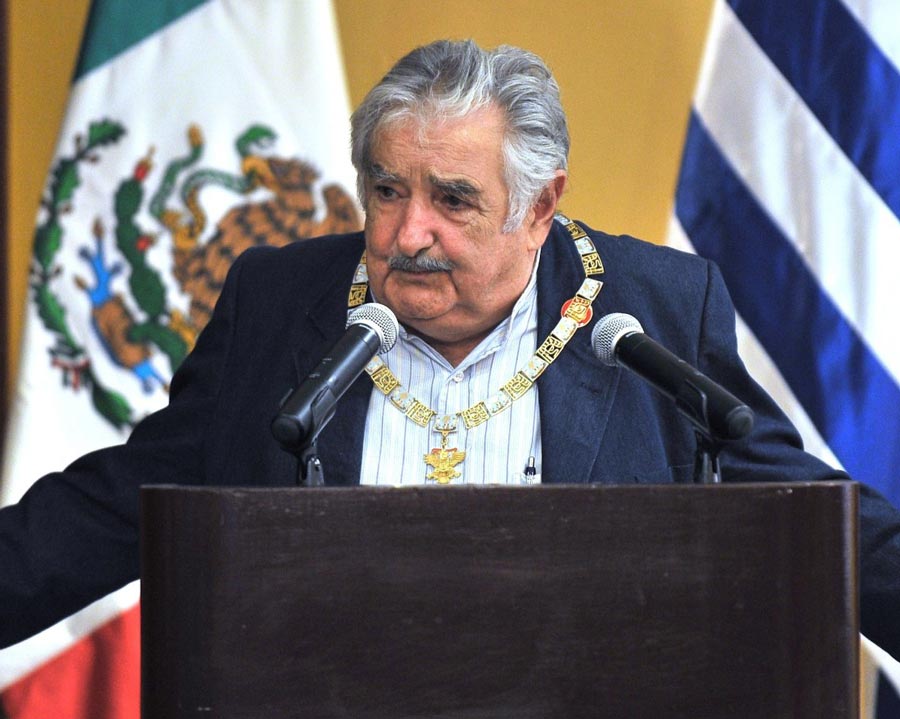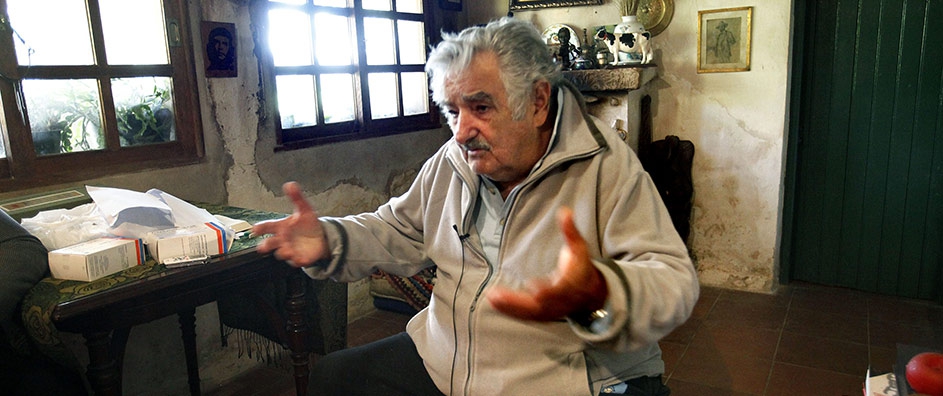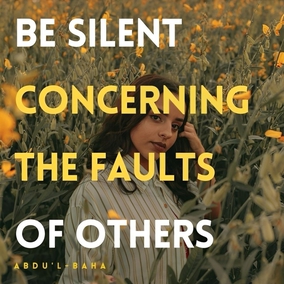The views expressed in our content reflect individual perspectives and do not represent the authoritative views of the Baha'i Faith.
If you knew what I know about the power of giving, you would not let a single meal pass without sharing it in some way. – Buddha
We only have what we give. – Isabel Allende
Nearly all men can stand adversity, but if you want to test a man’s character, give him power. – Abraham Lincoln
For five years, the 40th national leader of the South American country of Uruguay, Jose Alberto Mujica Cordano, was the world’s poorest president. He served from 2010 to 2015, and retired at the age of 81. He and his wife live on a small, austere chrysanthemum farm outside the Uruguayan capital of Montevideo—and they lived there throughout his presidency, refusing to occupy Uruguay’s lavish presidential palace and be waited on by its many servants.

President Jose Mujica
As the President of Uruguay, “Pepe” Mujica donated 90% of his $12,000 monthly salary to charities for the poor and small entrepreneurs. The amount left over, he decided, would be the median income of all the citizens of his country. His wife owns their farm, so President Mujica’s humble lifestyle includes just one major possession: a 1987 Volkswagen Beetle. He listed the old car’s value–$1800—as his only asset and total net worth in 2010, the first year of his presidency.
When President Mujica left office in 2015—with a record-high approval rating and a thriving economy—a wealthy Arab sheik offered him $1 million for his now-famous Volkswagen. He said, if he did sell the old car, that he would donate the entire amount to a program he supports for housing the homeless.
His humility may have come from the 13 years he spent in prison, a captive of the brutal Uruguayan military dictatorship at the time. His imprisonment included two years of solitary confinement underground in an empty old horse-watering trough. He said “My years in jail were a bit like a workshop for me—that actually forged my way of thinking and my values.”
President Mujica viewed his presidency as a way to serve the people of his country, not as a way to enrich or elevate himself. He modestly saw the job as a civil service position.
Can you imagine what the world would be like if all leaders acted this way?
The Baha’i teachings recommend exactly that:
O ye rulers of the earth! Wherefore have ye clouded the radiance of the Sun, and caused it to cease from shining? Hearken unto the counsel given you by the Pen of the Most High, that haply both ye and the poor may attain unto tranquillity and peace. We beseech God to assist the kings of the earth to establish peace on earth. He, verily, doth what He willeth.
O kings of the earth! We see you increasing every year your expenditures, and laying the burden thereof on your subjects. This, verily, is wholly and grossly unjust. Fear the sighs and tears of this wronged One, and lay not excessive burdens on your peoples. Do not rob them to rear palaces for yourselves; nay rather choose for them that which ye choose for yourselves. – Baha’u’llah, Gleanings from the Writings of Baha’u’llah, p. 253.
“Choose for them that which ye choose for yourselves,” Baha’u’llah counseled the leaders of the world in his messages to them. Written in the latter part of the 19th Century, those letters and tablets to the planet’s kings, rulers and ecclesiastical authorities advised every politician and monarch to detach and disarm—and to devote all their efforts to justice, equity and peace.
During his speaking tour of North America in 1912—a presidential election year in the United States—Abdu’l-Baha spoke about the true qualifications of a national leader at Phoebe Hearst’s home in Pleasanton, California:
The president must be a man who does not insistently seek the presidency. He should be a person free from all thoughts of name and rank; rather, he should say, “I am unworthy and incapable of this position and cannot bear this great burden.” Such persons deserve the presidency. If the object is to promote the public good, then the president must be a well-wisher of all and not a self-seeking person. If the object, however, is to promote personal interests, then such a position will be injurious to humanity and not beneficial to the public. – Mahmud’s Diary, p. 327.
No leader or ruler could do anything better than following this radical advice. In fact, the Baha’i teachings promise such selfless leaders “the highest righteousness of all:”
…is there any deed in the world that would be nobler than service to the common good? Is there any greater blessing conceivable for a man, than that he should become the cause of the education, the development, the prosperity and honor of his fellow-creatures? No, by the Lord God! The highest righteousness of all is for blessed souls to take hold of the hands of the helpless and deliver them out of their ignorance and abasement and poverty, and with pure motives, and only for the sake of God, to arise and energetically devote themselves to the service of the masses, forgetting their own worldly advantage and working only to serve the general good. – Abdu’l-Baha, The Secret of Divine Civilization, p. 103.
Next: Elites versus Populists: the New Attempt to Divide Us
You May Also Like
Comments

















A group of senators were sent to tell Cincinnatus that he had been nominated dictator. According to Livy, the senators found Cincinnatus while he was plowing on his farm. Cincinnatus cried out "Is everything all right?" They said to Cincinnatus that they hoped "it might turn out well for both him and his country," and then they asked him to put on his senatorial toga and hear the mandate of the senate. He called to his wife, Racilia, telling her to bring out his toga from their cottage.[5]
When he put on his toga, the senatorial delegation hailed him as dictator, and told him to come to the city. He then crossed the Tiber river in a boat provided by the senate, as his farm was on the far side of the river. When he reached the other side of the Tiber, he was greeted by his three sons and most of the senators. Several lictors were given to him for protection.
The next morning, Cincinnatus went to the Roman forum and nominated as his Master of the Horse (his second in command) Lucius Tarquitius, who was considered one of the finest soldiers in Rome. Cincinnatus then went to the Roman popular assembly and issued an order to the effect that every man of military age should report to the Campus Martius—the Field of Mars, god of war—by the end of the day.[6]
Once the army assembled, Cincinnatus took them to fight the Aequi at the Battle of Mons Algidus. Cincinnatus led the infantry in person, while Tarquitius led the cavalry. The Aequi were surprised by the double attack and were soon cut to pieces. The commanders of the Aequi begged Cincinnatus not to slaughter them all.[7]
Cincinnatus did not want to cause any unnecessary bloodshed, and told the Aequi that he would let them live if they killed three major people for him and brought their leader, Gracchus Cloelius, and his officers to him in chains. A yoke was set up, made up of three spears, and the Aequi had to pass under it in an act of submission, bowing down while confessing that they had been conquered. After this, the war ended and Cincinnatus disbanded his army. He then resigned his dictatorship and returned to his farm, a mere fifteen days after he had been nominated dictator.[8]